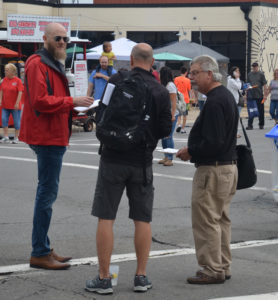
By Steve Brawner, © 2019 by Steve Brawner Communications, Inc.
Dr. Michael Pakko doesn’t have a problem getting people’s attention when he stands before Arkansas business leaders to give his annual state economic forecast. Last Saturday was a little harder.
On that day, he was asking voters to sign a petition qualifying his Libertarian Party for next year’s ballot while standing in front of a vendor that was selling funnel cakes and other items at Toad Suck Daze in Conway.
Pakko is chief economist and state economic forecaster at the University of Arkansas at Little Rock’s Arkansas Economic Development Institute.
He’s also the state Libertarian Party chairman, which became harder this year with the passage of Act 164. It increased the number of signatures third parties must collect for ballot access from 10,000 to almost 26,750 in a 90-day period.
That’s a lot. Because some of those signatures will be invalid, the party will need to collect well into the 30,000s to be sure it has enough. Pakko figures that’s about 400 a day for 90 straight days.
Under state law, the major parties avoid this task because their candidates for governor last year tallied at least 3 percent. The Libertarian candidate won 2.9 percent – a new high, but still not enough.
Act 164 moved easily through the Legislature. Pakko arrived early for one committee hearing, he thought, only to learn the meeting time had changed and the bill had already advanced. He was allowed to testify after the fact, but he soon realized he wasn’t changing many minds.
Furthermore, the act included an emergency clause, meaning it went into effect upon passage, despite the election being a year-and-a-half away. Otherwise, the party could have qualified by collecting the old 10,000 signatures.
Last year, Libertarians ran candidates in all four congressional races, all the statewide ones, and 12 state legislative races. Their candidate reached 3.5 percent in only one race where both a Republican and Democrat were running. In 10 races, Libertarians offered voters the only alternative to a Republican or Democratic incumbent.
In other words, Libertarians aren’t a threat to win any major races, but they’re also not crowding up the ballot. And they at least offer voters a choice – one that drastically would reduce government everywhere, from health care to Social Security to the drug war.
Nothing was broken that needed to be fixed, and there was no emergency. The bill was introduced and supported mostly by Republicans, though some voted against it and some Democrats voted yes. To some extent, probably a large one, it was about making sure a third party candidate’s 3-4 percent doesn’t affect some outcome somewhere.
“There’s a sense among some of the Democrats and Republicans … that those votes belong to them, and they’re going to divide them up as the voters see fit,” Pakko said. “But we just don’t agree that the votes belong to the two big parties. The votes belong to the voters, and we’re offering them an alternative.”
Libertarians have sued to return to the 10,000-signature standard. Meanwhile, Pakko was at Toad Suck Daze trying to catch the attention of passersby. With him was Joe Swafford, who ran for Congress last year, along with three paid signature gatherers.
Pakko didn’t dispute it when I described him as a “cerebral introvert.” But his personality didn’t stop him from asking people if they were registered Arkansas voters and if they would sign. He would tell them they didn’t have to vote for any Libertarians. The party just wants a chance to be on the ballot.
Many brushed by, including a former legislator turned lobbyist. One woman said she was moving to Indiana. A man said kind of loudly, “No, it don’t do no good to vote.”
But there were successes. A Republican county elected official signed, as did a woman who initially declined until her friend, a Tennesseean, told her voters need more choices. After Tom Herter of Hot Springs Village signed, he said he was “very definitely” frustrated with the two parties but had not voted for Libertarians previously and didn’t know if he would vote for any in the future.
The party had collected about 7,000 signatures when the day started after a month of trying. Pakko and his fellow gatherers collected about 665 Saturday, including mine.
It was the party’s best day yet. If all of them are valid, it still had 19,000 to go.